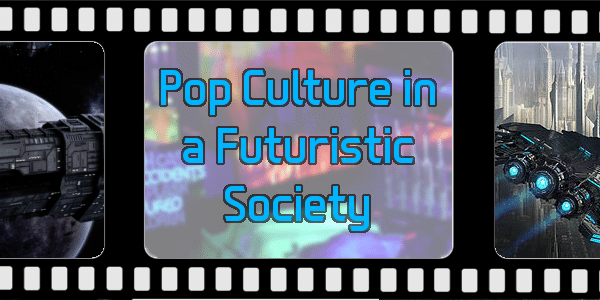Unless your futuristic society is comprised entirely of robots (a valid choice, of course), then there is going to be some sort of popular culture. People are going to want entertainment, are going to want to relate, are going to need a sense of belonging (at least a certain segment of society). What form that takes is entirely up to you, but history can provide a guide.
Historical Pop Culture
“You going to the gladiator games tonight?”
“Who’s your favorite charioteer?”
“I can’t wait to see Shakespeare’s new play.”
“Is Beethoven playing tonight?”
“Got a spare ticket to the Yanks/Giants game?”
“Can you believe Clark Gable cussed on screen?”
“You want to come listen to the new Beatles album?
It’s gone on centuries, and shows no sign of disappearing in the future. We aren’t all wearing matching silver jumpsuits yet (remember, we’re in the far future for those 1930’s pulp sci-fi novels), and if anything, popular culture is getting more diverse, more widespread, and easier to interact with.
Anything that doesn’t contribute to to basic survival, provides entertainment, and can unify people through common experience can be considered popular culture. It’s a pretty broad category. Using those criteria you can find numerous examples throughout history that would apply.
What will endure?
If you can imagine all the one-hit wonders, failed novels, and fads that are over and forgotten in weeks, there is plenty of popular culture with a short shelf life. But every generation, there is something bound to endure a little longer, something with a timeless quality that comes to represent that time period for citizens of the future–us. But what about residents of your futuristic world? If you’re building on Earth’s history, what will still be relevant for residents of the future?
In 2200, will people listen to the Rolling Stones?
In 3000, will anyone make references to Dickens or Dostoevsky?
By the year 8000, will there still be anyone who uses references to Homer or Shakespeare?
These questions are up to the writer. If society continues to evolve, you can easily imagine that some monumental works hold up indefinitely. But after cycles of cataclysm and recovery, some historical references can get lost. Decide what makes the cut in your futuristic setting.
Perspective on current culture
An import subset of what the future will remember is how it will remember our own time. Is modern Earth the pinnacle of popular culture (I weep for the future), a blip in a long, storied history, or mostly forgotten?
If you want touchstones to modern life, consider a few factors. Classical music is still fairly popular in some circles. People reenact the American Civil War. Dude ranches (I guess they’re called “guest ranches” now) romanticize the Old West. Renaissance fairs are still around, and some people visit them regularly. The point being, there will be people who pick a period of history and embrace its lifestyle or culture. If you want to put modern life in perspective in your futuristic setting, one or more characters with this perspective on our time can accomplish that.
Projecting the future
If you set your story 300 years in the future, you can’t ignore cultural development in the intervening time. If your characters speak in movie quotes and use 20th century slang, it’s going to seem weird that they don’t make references to popular culture closer to their own time period.
The good news? You don’t actually have to film movies, compose songs, or write books that fill the time period between now and then. All you need to do it pick out snippets of things that happened and make references to them. Use titles or genres in conversation, refer to an article of clothing as reminiscent of a movie, or have a type of yet-to-be-performed music playing in the background. A little can go a long way.
Pop Culture in Black Ocean
My Black Ocean series is set in the middle of the 26th century. The main character, Carl Ramsey, is a con man and the son of a con man. His father was a comedian who made his career mainly by stealing from acts so old that no one remembered them. He stole twentieth century acts. Carl grew up immersed in that culture, going to themed shows, watching and listening to entertainment from the earliest decades of recorded performances.
This makes Carl a more relatable character. He knows song and movies the readers know, but he also keeps up with modern (in-fiction) entertainment. Occasionally he gets grief from his friends or acquaintances for his outdated taste in music, which highlights the fact that this outlook on our more recent past is atypical.
One thing in particular that this does for readers is convey mood. Granted, not every reader is going to know what Jimi Hendrix or The Who sound like, but for those that are, a known song going on in the background can tell a lot more than one that was made up for the story. Consider the two following passages:
The mercenary sat staring out the window at the stars beyond, listening to Tears in Heaven play from his datapad.
The mercenary sat staring out the window at the stars beyond, listening to The Life We Forgot play from his datapad.
You might be able to infer the content of the song in the latter, but you don’t know what it sounds like. But if you’re familiar with Tears in Heaven, you can’t help but hear it in your head. It carries a mood and a sadness deeper than an invented title. No matter how many words you put behind that title to explain it, it won’t have the same impact.


Heh. Pretty much all my stories are infused with music somehow, considering it’s my non-writing obsession. I had a fun time trying to think about what styles would be considered the popular charting music of a few hundred years in the future… 🙂